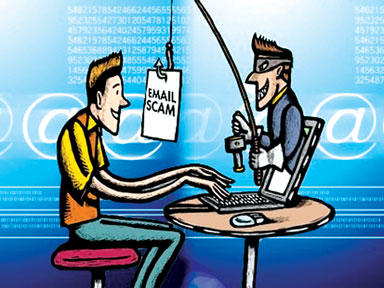|
E-mails that steal:
Beware of fraudsters on the Net!
By Shirajiv SIRIMANE
Gone are the days when people received chain letters by post, saying
that they should 'copy the letters by hand and post them to seven
friends or the gods would punish them' such letters spelt out the
benefits one would receive if the letters were posted and the frightful
things that had happened to people who had ignored the letter.
 With the development of IT and e-mails being a common means of
communication, these letters have now taken an 'e' form. Only a few
internet users haven't still received such e-mail. With the development of IT and e-mails being a common means of
communication, these letters have now taken an 'e' form. Only a few
internet users haven't still received such e-mail.
However, today, these innocent forms of invading one’s privacy have
taken a more sinister and dangerous turn with organised gangs sending
mail and cheating Internet users out of large sums of money.
The common modus operandi used by these groups is to send a mail that
the particular internet user has won prize money and the name and number
of a bank account are required to deposit the money to their credit
card.
The unsuspecting user would gladly provide the information and would
soon find out that a large sum of money had been withdrawn from his/her
account. However, with advancements in technology, banks have taken
measures against this method to protect their clients.
The USA Lottery too was exploited this way until prevention methods
were adopted to stop its abuse. The most recent method employed by these
Internet fraudsters was to use a popular mobile phone brand name to
cheat clients.
Following is the first e-mail an Internet user would receive from
this phone company from London, United Kingdom.
"We are pleased to inform you of the result of the just concluded
annual final draws (Random E-mail Selection Programme Worldwide).
"In line with the commemorating event marking our 42nd anniversary we
rolled out over 100,000,000 (one hundred million) British Pounds for our
42nd Anniversary Draws which thereby won you one million British Pounds.
The online draws were conducted by a random selection of e-mail
addresses from an exclusive list of 50,000 e-mail addresses of
individuals and corporate bodies picked by an advanced automated random
computer search from the internet.
"Congratulations!
"You are to contact the promotions manager with details below for
further claims processing.
(Contact promotion manager) Name: Mr. Mark Cole Tel: +447031886012
Fax: +447092865408
Provide him with personal details with which he will begin the
processing of your winnings.
Regards, Mrs. Sarah Peters”
Many users fell prey to this scam as these so-called Lottery Winners
gang' provided telephone numbers which actually worked. The ‘lottery
winners' could speak to the members of the team based in London. The sum
won by each person was somewhat unbelievable as it was over Rs. 175
million.
The winners were asked to take insurance from the home country and to
open an account in a bank named Skype Bank in London. They were even
clever to create and link a bogus website to this bank.
The clause put forward by this promotion company was that a person
has to deposit 850 British pounds and create an account so that the
prize money could be deposited in that account.
Many people trusting the brand name had actually deposited money
worth this amount and soon realised that they were not receiving any
more mail and also that the telephone number that was provided was now
disconnected.
It was then that the internet users realised that they had been
cheated. Unfortunately, they had no place to complain or nowhere to go
to. The local Police would say that this is an international crime and
that they should seek assistance else where. Finally, the users found
that there was no alternative other than to keep quiet and bear the
loss.
Computer programmed
Second and third e-mails confirming the prize were sent to the
victims. Even when the 'winners' had sent some jumbled words they had
received the second and third e-mails almost instantly, which clearly
proves that these were computer-programmed e-mails.
"The irony of this whole issue is that neither Central Banks, Police
nor the FBI are doing much to take these culprits to book. They simply
take the money and run," one disappointed user said.
One of the other commonly used methods is asking an internet user's
help to secure some funds which were to be deposited from African
countries.
This is one such mail....
"From Mrs Norlela Mohd Amin 01 BP Rue 14 Abidjan Cote D Ivoire.
"Greetings,
"I am Mrs Norlela Mohd Amin, 46 years old, from Malysia, but residing
in Cote D'Ivoire.
"I have USD 6.3 million which came from my late husband Mr Mohd Amin
before he died in October 2009. This money is left in a suspense account
in a bank here in Cote D'Ivoire.
"I seek your permission to remit this amount into your account for
the purpose of donation to the orphans and less privileged in your
country. Or for the purpose of building churches or mosques. I am
actually suffering from cancer and my doctor has confirmed that I
wouldn't survive. I have no son or daughter that can take care of this
project; that is why I am seeking your attention to carry out this
project.
"But the fact is this, can I trust you? Once I hear from you I can
attach my international passport, and again I can give you the doctor's
direct telephone number if there is any need for you to speak with me.
"Thanks and God bless!
My Best Regards
Mrs Norlela Mohd Amin"
Another infamous scam involves a friend writing to you from a known
e-mail address, saying that he or she is stuck in an airport and
urgently needs cash to either fly back or go to another destination.
The receiver will oblige a good friend and deposit the money in the
account and soon find out that the friend whom he/she deposited the
money never went abroad and if he/she went abroad never got stuck in an
airport.
 What is being done here is, an e-mail address is hacked the friend's
name list being extracted and chain mails sent requesting financial
assistance. They also create a temporary bank account to receive the
funds. What is being done here is, an e-mail address is hacked the friend's
name list being extracted and chain mails sent requesting financial
assistance. They also create a temporary bank account to receive the
funds.
Sometimes users get e-mails from their friend and colleague who is
supposed to have gone overseas, while that person is working next to
them!!!
The success of the scammers depends on at least one person who may
not have met this friend recently and is ready to help with a few
thousand rupees. In addition internet 'robbers' have even gone to the
extent of stating that they are representing the Central Bank of the
country or claim to be the first lady of an African State.
Here again, the so-called first lady would ask the user to open a
bank account with a deposit and the user would soon find out that they
have fallen victim to another scam on the net.
Nanny e-mail
The 'nanny' e-mail is another scam internet job seekers fall prey to.
There are advertisements for nannies in the UK and applicants are
informed that they have to look after a child or an elderly person.
The salaries offered in the UK are very high and the facilities very
pleasing. However, the catch is when it comes to obtaining visas.
The scammers would say that visas have to be obtained from Indonesia
and request the 'job seeker' to send a copy of the scanned passport and
visa fees amounting to around Rs. 40,000 to be deposited to process the
visa.
The usual story takes over from there with non-working phone numbers
and e-mails going dry and the job seekers would soon find that they had
been robbed of around Rs. 40,000.
Bank account numbers
Some other forms of Internet fraud are asking for a user's bank
account number, saying that the person has doubled the money; actually,
in this instance, cash is deposited. The user who trusts the website
then deposits larger amounts and finds that there are no returns this
time around and he/she has lost even the cash sent the first time.
E-mail users are also invited to come in person to countries such as
Singapore and Laos to sign a deal where they would inherit a large sum
of money. Some users after divulging their account numbers have gone to
that country to find that there is no such address in existence.
A 'beautiful girl' calling you 'darling' too would write to you,
saying that she wants to move out of Russia or some other country and
needs visa assistance. She will also promise to be your life partner.
After exchanging two or three e-mails, the beauty would send her
photographs and would demand money as visa fees.
An official from the Central Bank said that sadly there are no laws
protecting the public from these well-organised scams. "One should not
be tempted to provide bank account or credit card numbers. The best form
of defence is to ignore these mails," the official said.
When contacted, a credit card issuing bank too endorsed the Central
Bank view and said that very little can be done to reclaim the money as
these scammers are very quick to close accounts and disappear. "It is
also a painstaking procedure to cancel the transactions and reclaim the
cash," she said.
However, users who have been subjected to this fraud said that more
should be done by the authorities specially those who are based
overseas.
|

